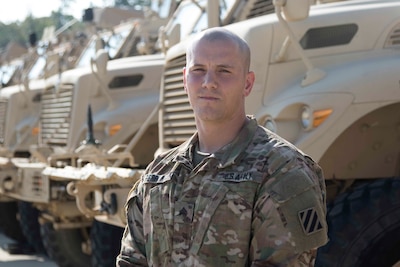By Army Staff Sgt. Sierra A. Melendez 50th Public Affairs
Detachment
FORT BENNING, Ga., Nov. 2, 2017 — Growing up in Springfield,
Missouri, Army Sgt. Jeston L. Perryman never envisioned being a skilled
operator of foreign military-grade weapon systems. Even after enlisting, he
imagined he would primarily troubleshoot malfunctions of infantry weapons and
towed artillery.
Perryman's assumptions would be correct – in a typical Army
unit.
However, Perryman serves in the Army's 1st Security Forces
Assistance Brigade, an exclusive specialized unit made up of soldiers selected
based on qualifications and experience.
"It has, hands down, been the greatest opportunity I
have had in my career," Perryman said. "I have done things in the
short amount of time I have been assigned here that many don't get to
experience once in their time in the Army."
As part of Army Chief of Staff Gen. Mark A. Milley's
initiative, the brigade is designed to conduct security force assistance
operations to train, advise, assist, accompany and enable partner-nation
security forces in support of combatant command requirements worldwide.
In the past, advise-and-assist missions were conducted
primarily by brigade combat teams. The creation of security forces assistance
brigades will allow brigade combat teams to shift their focus back on readiness
for warfighting against near-peer threats.
Elite Fighting Force
Perryman touts the security forces assistance brigade as
building an elite fighting force with a caliber of training and leadership
surpassing any other unit he has served with.
"It has been constant specialized training events, one
after the other," he said. "Myself and other soldiers have had the
opportunity to attend Army schools that I know I wouldn't have had the
opportunity to in a traditional line unit."
For example, Perryman, along with all other soldiers in the
brigade, have attended the Military Advisor Training Academy.
"We've already done some simulated key leader
engagements with soldiers acting as role players as Afghan counterparts during
the MATA," said Perryman. "It's unlike anything I have ever done
before."
Additionally, Perryman had the opportunity to attend foreign
weapons training, receiving close to the same experience the Army's special
operations community has on the subject.
"We were able to get familiarized with Afghan weapon
systems such as the AK-47, the Rocket Propelled Grenade 7 and the DShK,"
Perryman said. "This way, we are adequately prepared to train our
foreign-national counterparts on their own weapons."
Latest Equipment
Foreign weapons familiarization is not the only incentive
that soldiers have to look forward to if
they make the decision to apply for the premier, volunteer-only unit. Security
forces assistance brigade volunteers will receive the latest personal equipment
and arrive to the battlefield using vehicles that include a combination of
up-armored Humvees; mine-resistant, ambush-protected vehicles and light medium
tactical vehicles.
Volunteers will receive training that includes common core
operations, advising, communications, foreign weapons, and foreign language
training, culminating with division-level sponsored capstone exercises at one
of the Army's combat training centers prior to deployment.
Higher Deployment Tempo
Like many soldiers who raise their right hand to serve,
Perryman knew he wanted to deploy – soon and often. Although much of the Army
has seen a decline in frequency in overseas and combat deployments, security
forces assistance brigades will deploy to combat and will likely have a higher
deployment tempo than other conventional Army units.
Perryman urged his peers to obtain more information if they
think they are interested in the opportunities the new brigade has to offer.
"My company has 51 people, so you really get to know
each other," he said. "There is a type of unit cohesion that is
unlike any other unit that I have served with. It's great. You know everyone
here deserves to be here."









No comments:
Post a Comment